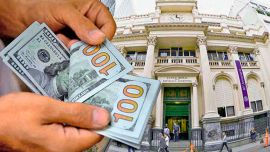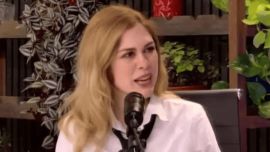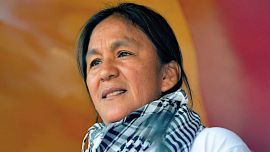Argentina allowed its currency to weaken by more than 20 percent on official markets Monday in anticipation of a market backlashto outsider libertarian economist Javier Milei’s upset primary election win.
The peso was trading at 365.50 per US dollar at the Banco Nación state bank by midday, compared to a close of 298.50 last Friday.
The Central Bank moved to raise interest rates by 21 points to 118 percent to contain deposits in bank accounts and calm turmoil – in its third big hike in five months. The monetary authority said the move would help cushion "exchange rate expectations, and minimise the repercussion on prices."
The peso also slumped on parallel markets to a record low, while the country's dollar bonds declined across emerging markets. Dollar bonds and Argentine shares on Wall Street fell around 10 percent.
There was still no official statement from the authorities in response to the exchange rate turmoil, but market movements confirmed analyst speculation prior to the vote that the official exchange rate would be allowed to weaken.
Officials hope to keep the rate fixed at that level until the presidential elections in October, government sources briefed. The devaluation of official rate is the largest in a single day since December 2015. The peso has weakened 97.6 percent against the dollar so far this year.
The informal market's "blue dollar" – the most freely accessible parallel rate to residents and businesses amid strict currency controls – was trading at a record of 700 pesos per greenback on Monday, putting off nearly all traders.
The libertarian Milei, a political outsider who has proposed dollarising the country's battered economy, performed much better than expected in Sunday's vote, in what local media referred to as a "political tsunami."
Argentines selected their favourite from more than 20 potential presidential candidates, allowing parties to pick their frontrunner while providing a key popularity test ahead of the October election.
Milei scored 30 percent of votes, ahead of the right-wing opposition candidate Patricia Bullrich who scored 28 percent, and the ruling centre-left coalition's candidate Economy Minister Sergio Massa, who came third with 27 percent.
The Latin American giant is gripped by deep economic malaise, with annual inflation at 115 percent, and poverty at 40 percent.
Rumours swept around political circles on Monday that some kind of exchange rate simplification is on the cards.
The International Monetary Fund (IMF) has been pushing Argentina to simplify capital controls during negotiations over repayments for the country’s US$44-billion debt programme. Agreeing to a disbursement of US$7.5 billion in funds earlier this month, Fund officials again underlined the point.
– TIMES/PERFIL






















Comments